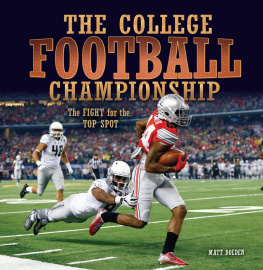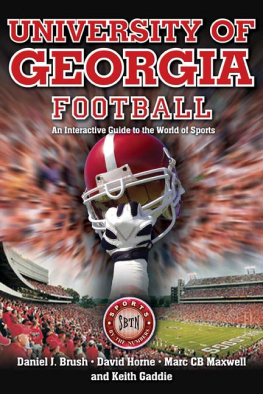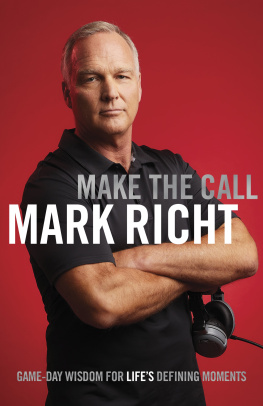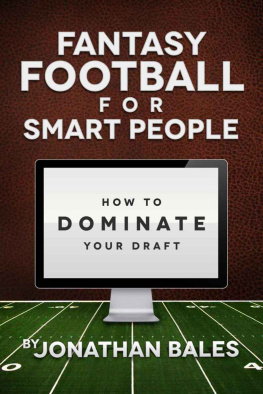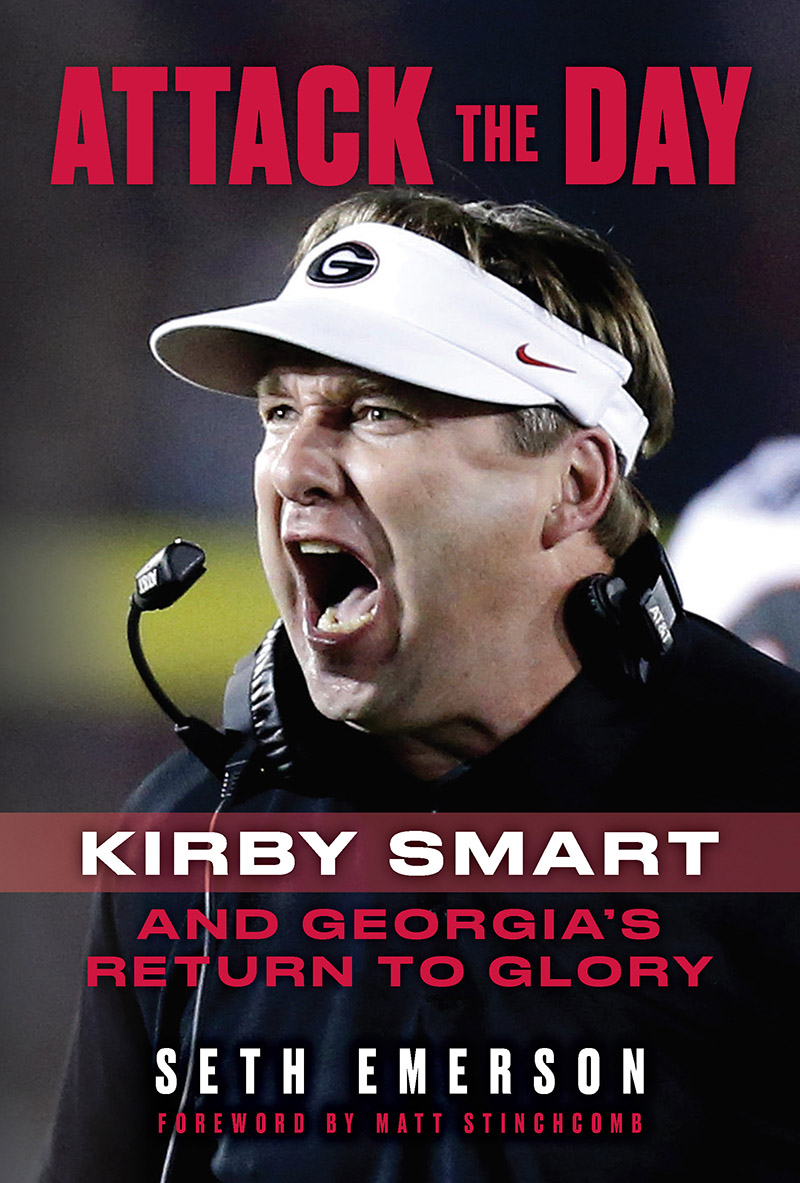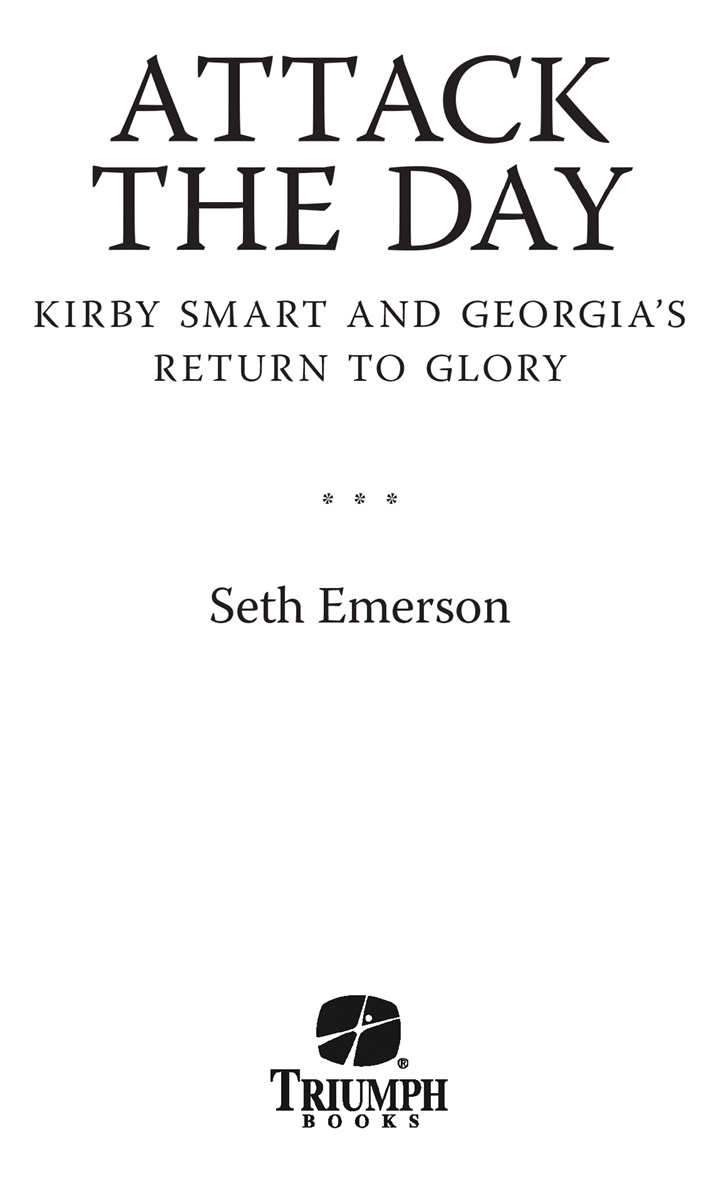
For Kerstin, Alex, Amelia, and Archie
Contents
Foreword by Matt Stinchcomb
The kid in front of me was this little guy who started talking to me out of the blue while we were waiting in line. This was a football camp at the University of Georgia, and they had grouped high school prospects alphabetically as we got ready to run the 40-yard dash. So I just thought this little guy was friendly, and he was, but he also had an ulterior motive, as I found out right before it was his turn to run. Hey, big boy, the kid said. Put your foot down right here for me, would ya?
I did. And he used my foot as his starting block for the 40. That was my first encounter with Kirby Smart. You could see it even then: he was a competitive guy with talent and a mind at work. He was probably already plenty fast, but why not use all the tools available to you? And apparently my foot was one of them.
We would be teammates (and often classmates) for four years at Georgia on different sides of the ball. There isnt a lot of direct interaction between an offensive tackle and a safety. But even from the trenches, you couldnt help but notice and appreciate his awareness. Kirby was hyper-aware. By this I dont mean simply understanding his assignment or even everyone elses assignment. There are plenty of guys who are smart enough to know that. What I mean is he had an ability to be detail-oriented on a specific play while also understanding and seeing how it fit in the bigger picture of the game. Its the difference between knowing what to do and why youre doing it. It felt like he was always able to do that, and I think it was a big part of how he became an All-SEC defender. That and the fact that he was pretty darn good.
After our senior season, we went our separate ways. I went into the NFL, and Kirby went into coaching. A decade after we graduated, we reconnected. I was a TV game analyst for college football, and Kirby was the defensive coordinator at Alabama. Most coaches dont allow this, but when I was covering Alabama, Kirby would let me sit in on his meeting with his linebackers the Friday night before a game. I remember sitting there and being completely floored. What I saw and heard in that meetingthe amount of verbiage, checks, and adjustmentsshowed the system was next level in complexity. But complexity can be a disadvantage. It doesnt matter what a coach knows. What matters is what the players know. A slow player and a confused player look the same on film. What was remarkable was Kirbys mastery of the system and his ability to communicate it in a way where his guys could execute. Id been around a bunch of coaches as a player and as a commentator. He stood out.
Fast forward a few years. The talk was swirling that Georgia might make a head coaching change. Mark Richt had built the program into a destination job again. That wasnt always the case. I know because I was there when it wasnt; so was Kirby. Coach Richt put Georgia back where it belonged as a national title contender. The job was going to warrant interest across the coaching landscape, and despite the fact that he had never been a head coach before, Kirby had to be considered the top target because of his background and pedigree. Besides, if you were going to be an assistant coach somewhere, Alabama was a great training ground.
The start was not a smooth one. My TV crew covered the games. So I saw firsthand when Georgia lost at home to Georgia Tech and Vanderbilt and nearly lost to Nicholls State, an FCS team. Not only did I call those games on television, but I met with Kirby in the days before. Despite the difficulties of that seasonand there were more than a fewyou never got a sense that it was too much, that he was sitting in a chair that he didnt belong in. It didnt seem like overconfidence either. It was more like a certainty that he knew where the program could go and how we wanted to get it there.
It was more than a cultural overhaul involving how the team practiced and changes to the offseason program. The way he was recruiting created a mass infusion of talent. That alone garners a heightened level of competition. Games are played on Saturday. They are won and lost Monday through Friday. If you can create that atmosphere where the toughest team you play most weeks is the one you face at Wednesday practice, then you have a chance at excellence.
And now look at this Georgia program. Theyre always on the launchpad. Theyre poised for a championship every year, and thats exactly where you want your program to be. That makes this a special story. Kirbys a Georgia guy. He grew up in Georgia, played at Georgia, and got his first head coaching jobmaybe his only head coaching jobat Georgia. He just needs one thing to make it perfect.
Matt Stinchcomb was a first-team All-American offensive lineman at Georgia in 1997 and 1998. He is currently a college football analyst for ESPNU and SEC Network.
Prologue
This was where Kirby Smarts ability to survive without sleep came in handy. This was the day his new job was really beginning, the first time his entire staff would be in the room together, and all their eyes would be on him as he laid out his plan and issued directives.
And he was exhausted. Or should have been.
Smart had flown in after midnight from nearly across the country, where he had for the final time coached Alabamas defense while winning another national championship. Now he turned his full attention to his next job, head coach at Georgia, and was calling everyone to the conference room in the center of the complex of staff offices.
The mood was loose, the way it usually is the first time a staff is together. Everyone spent a few minutes figuring out where everyone sat. A couple holdovers from the previous staff were unsure whether they should sit in their usual seats. The former Alabama coaches were used to sitting in certain places at a table. And the rest just looked around, waiting to take the empty seats.
Smart then came in. It had been 37 days since he had officially been given his dream job. It seemed both so long and so short a time ago. Since that day he had celebrated his 40 th birthday, won a playoff semifinal, won a national title, watched Georgia win its final game without him as its coach, spoke to endless amounts of well-wishers, and put together the staff that now sat before him, awaiting his orders.
The first thing he did was outline his expectations for everyone as position coaches. There were nine of them, and almost all of them were veterans of the business who knew the basics. They already had spoken with Smart during the interview process, but it was important to Smart that he reiterate the objectives in front of the group: recruit, develop your players on and off the field, and recruit some more. Then Smart turned the meeting over to the Georgia athletic departments academic support staff, so it could explain how their side of things worked, how they worked with the players, and what the academic schedules would look like for the players. Then Smart went over each assistant coachs recruiting areas. This was something each coach probably already knew individually, but now each coachs area of responsibility was set forth for the whole group. Finally, Smart went over the schedule for the upcoming weekend. This was a Tuesday. Recruits would be coming that weekendand the next few weekends after that. Plans had to be made. Georgia had a lot of catching up to do. The meeting then broke up. It lasted about an hour. Speaking to his entire staff for the first time, Smart did not make any momentous big-picture statements. All business, said Shane Beamer, one of those new assistants. Lets go.




